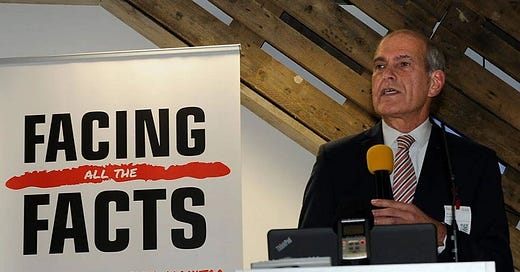Dutch Labor party tried to get country to stop selling Israel Iron Dome parts
The failed draft motion triggered a Jewish walkout from the movement, once the political home of Dutch Jewry.
Ronny Naftaniel speaks in Brussels, Belgium on Dec. 6, 2016. Photo courtesy of CEJI - A Jewish Contribution to an Inclusive Europe.
by Canaan Lidor
(JNS) — The Dutch Labor Party, a former political home for the country’s Jews, on June 19 called on the government to stop selling Israel parts for the Iron Dome rocket interceptor, triggering widespread condemnations and a walkout by Jewish members.
The draft motion, which the lower house of the Dutch parliament voted down by a large majority, said that “the interceptor is no longer used defensively by [Israeli Prime Minister Benjamin] Netanyahu, but as a part of the assault strategy” of Israel.
The draft motion’s language shocked many Dutch Jews and centrists, who said it reflected growing anti-Israeli radicalism within a left wing that’s eager to court a growing Muslim electorate.
During a party gathering on June 21, the motion’s author, Kati Piri, received a minute-long standing ovation from thousands of members present. She appeared overcome with emotion.
Dutch defense exports to Israel are extremely limited, totaling $4.5 million over the past 1.5 years, the RTL broadcaster reported. Of that total, about $350,000 was for radar systems that may be linked to the Iron Dome, though their importance and relevance to the system are unknown, RTL reported.
The practical implications of the ban that Dutch Labor promoted unsuccessfully are secondary to the move’s declarative significance, Ronny Naftaniel, a former leader of Dutch Jews, told JNS on June 22.
“As Israel is targeted by hundreds of Iranian missiles, Dutch Labor says Israel has no right to defend itself, essentially telling 10 million Israelis they could die as far as the party’s concerned. That’s what’s so terrible about this draft motion,” said Naftaniel.
He called on other parties to avoid forming a coalition agreement with Labor-Green Left due to its “radicalization,” as Naftaniel, a seminal figure of the Center for Information and Documentation on the Netherlands, or CIDI, a think tank and antisemitism watchdog group established in 1975, called it.
Several lawmakers challenged Piri on the draft motion in parliament, before it was defeated. “So as far as Labor-Green Left are concerned, parts to the Iron Dome should not be supplied even if that means towns and cities in Israel are exposed? Because that’s what you’re saying,” Eric van der Burg, a lawmaker for the centrist People’s Party for Freedom and Democracy (VVD) party, asked Piri.
“That’s your reasoning. Ours is that everything must be done to stop the violence,” said Piri, whose draft motion also accused Israel of “ethnic cleansing and genocide” in Gaza.
Piri explained that Iron Dome’s existence emboldened Israel to attack Iran, which Israel would fear doing if they did not have the defensive system. Iron Dome is designed for short-range rocket fire, from Gaza and Lebanon. The Arrow systems are designed for long-range missiles, such as those launched from Iran or Yemen.
The draft motion followed a recent fusion between Labor and the more extremist Green Left party. Together, the two parties have 25 seats out of 150 in the current Tweede Kamer, the lower house of the Dutch parliament, and are projected to win more in the coming elections, set to take place in October.
Naftaniel, the former head of the Central Jewish Board of the Netherlands, had been a Labor member for 45 years until last year, when he quit it in protest of its leaders’ public opposition to the arrival of Israeli President Isaac Herzog to attend the inauguration of a Holocaust museum.
Frans Timmermans, the head of Dutch Labor, has often vowed to oppose antisemitism and famously said that “Europe wouldn’t be Europe without its Jews,” but he has “allowed the party to fall to extremism, which the draft motion clearly illustrates,” said Naftaniel.
The draft motion spurred a fresh wave of resignations from the party by prominent Jews, including Michel Waterman, a columnist for the NIW Dutch-Jewish weekly. The draft motion is “unforgivable” and “actually says: go ahead and bomb Israel to bits,” Waterman wrote in his letter announcing his departure from Labor after 46 years of membership.
Another prominent Jewish member and former Labor European Parliament candidate, Robert Baruch, wrote on X on June 21 that with the draft motion, Labor ”has decided that I can no longer be a member.”
Labor-Green Left is the Netherlands’ largest opposition party, and polls predict it will grow further in this year’s election.
Several top Labor members criticized the draft motion, including former party leaders Lodewijk Asscher and Job Cohen, both of whom are Jewish, and Ad Melkert.
Earlier this month, Geert Wilders, the leader of the Party for Freedom— an anti-Muslim, pro-Israel movement that leads the current coalition— announced his party is pulling out of the coalition due to its inability to impose immigration restrictions. This led to the scheduling of early elections.
The Party for Freedom has also had friction with some of its coalition partners over Israel, including the VVD Foreign Minister Casper Veldkamp.
In an interview in the Het Parool newspaper published on June 21, he acknowledged that Wilders’ support of Israel was “one of the things” that made the partnership difficult.”
“I read a letter in which a group of lawyers wrote that the Dutch policy in the Middle East was strongly influenced by the leader of the largest party in the coalition. I say: for me, the government program is what matters. So we strive for an independent, viable Palestinian state alongside a safe Israel,” said Veldkamp.
He has supported a review within the European Union of its trade agreement with Israel following Israel’s war on Hamas in Gaza.



